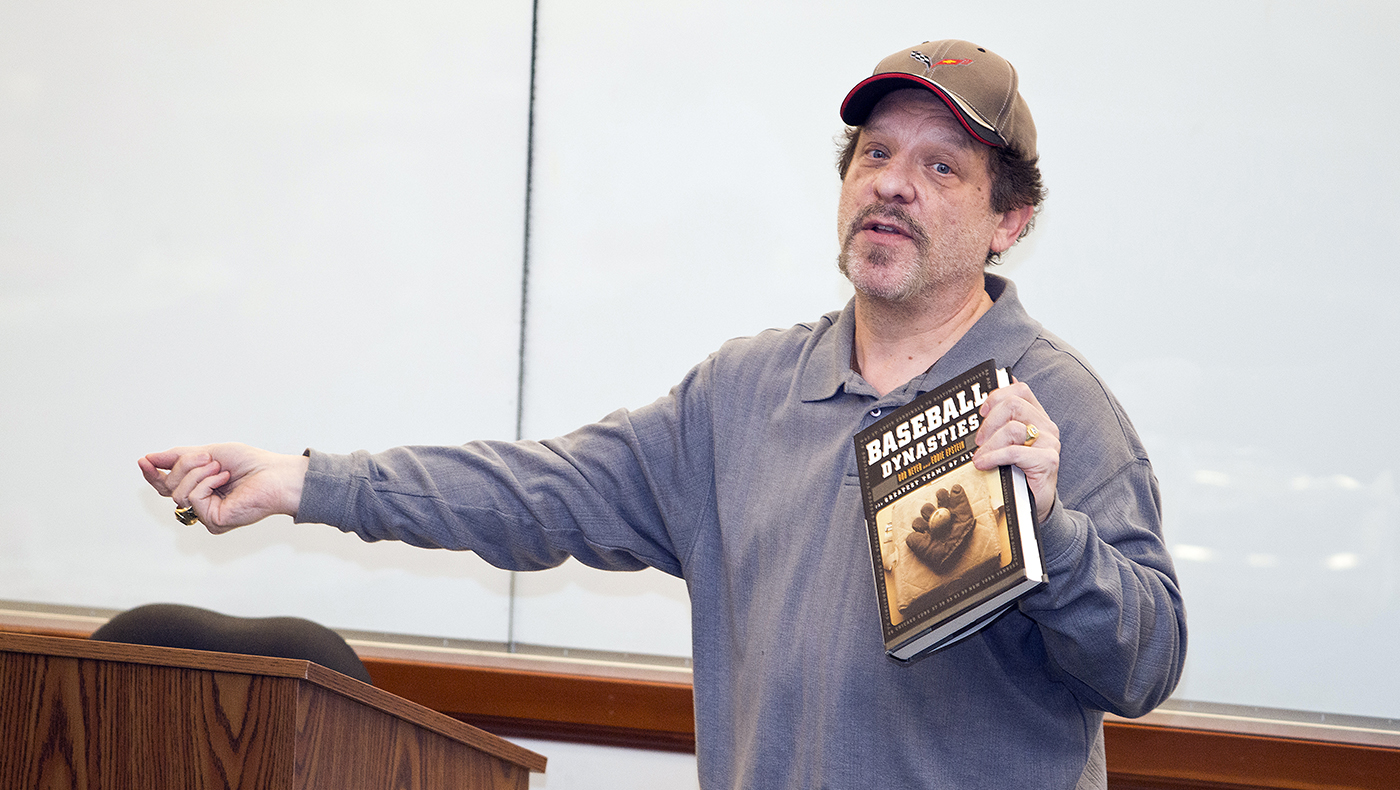The 2011 hit movie Moneyball, based on the book of the same name, tells the story of how a baseball team used statistics to change the trajectory of their season. It is a story that Eddie Epstein, Class of 1981 and MA Class of 1985, pioneer of modern baseball analytics (sabermetrics) and author of several sports analysis books, knows well.
More than 55 Delaware economics teachers attended an event at the University of Delaware on April 2, 2019 to watch Moneyball and hear from Epstein about his career and the role of economics, probability and statistics in Major League Baseball (MLB). UD Alfred Lerner College of Business and Economics’ Center for Economic Education and Entrepreneurship (CEEE) invited Epstein to speak as part of their annual “dinner and a movie” series tying popular films to economics. It is one of many programs from the CEEE that discusses well-known historical, significant and interesting events to help teachers convey sound and relevant economic educational content throughout Delaware schools.
After the film, Epstein introduced his talk, saying, “I was using analytics to help a major baseball organization make decisions for 15 years before Moneyball [the book] came out, and I was working for the A’s [the Oakland Athletics baseball team] when Michael Lewis was writing the book.”
Epstein began his career as the self-proclaimed “biggest baseball fan in the world.” While pursuing his MA in Economics at UD, Epstein picked up a book by Bill James on statistics in the MLB and thought, “I can do this.” After finishing his MA, Epstein started to work in baseball broadcasting, before moving on to office management and budget work for the Baltimore Orioles.
For Epstein, the connection between his study of business and working in sports was automatic. He said, “Economics is the study of the allocation of resources, and running a baseball team is about allocating finite resources.”
While working in the office management and budget office, Epstein wrote a letter to Orioles owner Edward Bennett Williams, explaining why using statistics and numbers would help the team run better. Epstein’s boldness led to an offer to work as a consultant. He was conducting analysis of the Orioles’ roster at a time when few teams were willing to invest in the new practice of sabermetrics. Epstein believed in the value of these numbers, saying, “Telling me this doesn’t work is like telling me I can’t measure heat with a thermometer.”
Epstein was right. Every prediction that he made in that analysis had come true within a year. After this success, Epstein moved between serving as director of operations for specific MLB teams and consulting for multiple teams at once. He consulted for the Oakland A’s for 10 years under Billy Beane, the general manager who is the focus of both the book and film Moneyball.
In Epstein’s consulting work, he found that the two statistics that correlate best are on-base percentage and slugging percentage. He also fought against the popular idea of thinking of a pitcher as a “winner.” He gave the example of a pitcher who once had 18 wins over eight losses, but Epstein still asked the general manager to trade him on the basis that he could never replicate that record. Epstein was right: Moving forward, in 215 innings pitched, he struck out only 62 batters.
When Epstein began his career in the 1980s he was on the cutting edge of major breakthroughs in the field of baseball analytics and strategy. The next big change to the field of sabermetrics came with the publication of Moneyball. As the book, and later film, gained popularity, the field of baseball analytics grew dramatically. The supply of analysts was higher than the demand, which led to the end of Epstein’s career in consulting. Epstein has turned his attention to a lifelong passion for automobiles and currently runs the blog Disaffected Musings.
Although he has left work in baseball, Epstein gave several recommendations for students interested in working in sports analytics. He explained that to be successful, they need to know how to code, work with statistics and program databases. Even with those skills, he cautioned that it is difficult to get a job with the increased interest in the field.
Reflecting on his career, Epstein explained that today, baseball is essentially what he predicted it would be in the 1980s, with statistics and data having become a major part of the sport. Epstein asserted that baseball is the best sport for data analytics, although ultimately there is human decision-making factor that will always play a role in the game.




